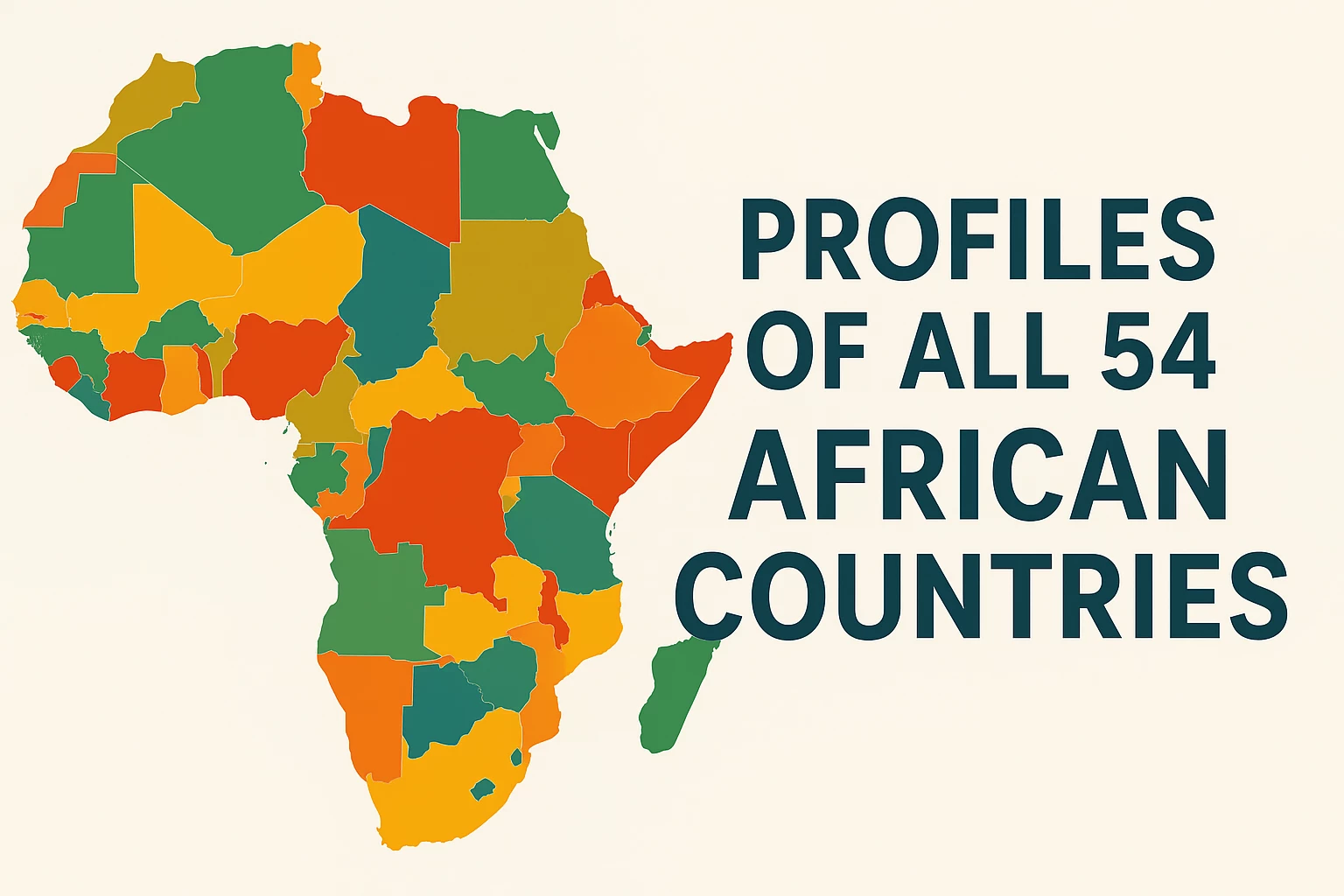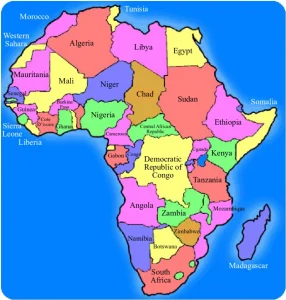
Profile of all 54 African Countries
Africa is a continent of remarkable diversity, history, and culture. With 54 recognized countries, it is home to over 1.4 billion people who speak thousands of languages and represent countless traditions. Each African country has a unique story — from its name’s origin and meaning, to its capital city, official languages, and the popular local languages spoken by its people. Understanding these details not only provides geographical knowledge but also deepens appreciation for Africa’s cultural richness, resilience, and global significance.
 This article compiles important information about each African country — including the origin of its name, its capital, official languages, major local languages, and key facts that highlight its importance. Together, these snapshots offer a panoramic view of Africa’s identity and role in the world.
This article compiles important information about each African country — including the origin of its name, its capital, official languages, major local languages, and key facts that highlight its importance. Together, these snapshots offer a panoramic view of Africa’s identity and role in the world.
Profiles of All 54 African Countries
1. Algeria
Name origin/meaning: From Latin Algeri(a); from Arabic al-Jazā’ir meaning “the islands.”
Capital: Algiers
Official language(s): Arabic, Tamazight (Berber)
Most popular local language(s): Algerian Arabic, Kabyle, Chaoui
Key fact: Largest country in Africa by land area; major oil and gas producer.
2. Angola
Name origin/meaning: From Ngola, the title of rulers of the Ndongo kingdom.
Capital: Luanda
Official language(s): Portuguese
Most popular local language(s): Umbundu, Kimbundu, Kikongo
Key fact: Rich in oil and diamonds; civil war lasted until 2002.
3. Benin
Name origin/meaning: From the Bight of Benin and historical Kingdom of Benin.
Capital: Porto-Novo (official); Cotonou is seat of government.
Official language(s): French
Most popular local language(s): Fon, Yoruba, Adja
Key fact: Birthplace of Vodun (Voodoo) religion.
4. Botswana
Name origin/meaning: From the Tswana people (Batswana).
Capital: Gaborone
Official language(s): English
Most popular local language(s): Setswana
Key fact: Stable democracy; diamond mining economy.
5. Burkina Faso
Name origin/meaning: “Land of Upright People” (Burkina = honest, Faso = father’s house).
Capital: Ouagadougou
Official language(s): French
Most popular local language(s): Mooré, Dioula, Fulfulde
Key fact: Culturally vibrant; faces recent security challenges.
6. Burundi
Name origin/meaning: From the Ruanda-Rundi peoples.
Capital: Gitega (political); Bujumbura is economic center.
Official language(s): Kirundi, French, English
Most popular local language(s): Kirundi
Key fact: One of Africa’s smallest, densely populated countries.
7. Cabo Verde (Cape Verde)
Name origin/meaning: Portuguese for “Green Cape,” after Cap-Vert in Senegal.
Capital: Praia
Official language(s): Portuguese
Most popular local language(s): Cape Verdean Creole (Kriolu)
Key fact: Volcanic island nation; strong diaspora community.
8. Cameroon
Name origin/meaning: From Portuguese “Rio dos Camarões” (River of Prawns).
Capital: Yaoundé
Official language(s): French, English
Most popular local language(s): Ewondo, Fulfulde, Duala
Key fact: Known as “Africa in miniature” for its cultural and geographic diversity.
9. Central African Republic
Name origin/meaning: Named for its location in central Africa.
Capital: Bangui
Official language(s): French, Sango
Most popular local language(s): Sango
Key fact: Rich in resources but politically unstable.
10. Chad
Name origin/meaning: From Lake Chad; “Chad” means “large body of water” in Kanuri.
Capital: N’Djamena
Official language(s): French, Arabic
Most popular local language(s): Sara, Kanuri, Arabic dialects
Key fact: Landlocked; hosts Lake Chad, vital for millions.
11. Comoros
Name origin/meaning: From Arabic “al-Qamar” (the moon).
Capital: Moroni
Official language(s): Arabic, French, Comorian (Shikomori)
Most popular local language(s): Shikomori
Key fact: Archipelago nation in Indian Ocean; predominantly Muslim.
12. Democratic Republic of Congo
Name origin/meaning: Named after Congo River, itself from Kongo people.
Capital: Kinshasa
Official language(s): French
Most popular local language(s): Lingala, Swahili, Kikongo, Tshiluba
Key fact: Africa’s second-largest country; rich in minerals.
13. Republic of Congo
Name origin/meaning: From Congo River and Kongo people.
Capital: Brazzaville
Official language(s): French
Most popular local language(s): Lingala, Kituba
Key fact: Brazzaville is directly across the river from Kinshasa.
14. Eritrea
Name origin/meaning: From Italian “Eritrea,” based on Greek “Erythraia” (Red Sea).
Capital: Asmara
Official language(s): No declared official; Tigrinya, Arabic, English used.
Most popular local language(s): Tigrinya, Tigre, Afar
Key fact: Gained independence from Ethiopia in 1993.
21. Ghana
Name origin/meaning: Named after the ancient Ghana Empire. It mean ” Brave worriors”
Capital: Accra
Official language(s): English
Most popular local language(s): Akan (Twi, Fante), Ewe, Ga
Key fact: First sub-Saharan African country to gain independence (1957). Rich in Gold, cocoa..
22. Guinea
Name origin/meaning: Derived from Berber word “aginaw,” meaning black.
Capital: Conakry
Official language(s): French
Most popular local language(s): Susu, Fulani (Pular), Maninka
Key fact: Rich in bauxite and minerals.
23. Guinea-Bissau
Name origin/meaning: Named after Guinea region; Bissau added to distinguish from Guinea.
Capital: Bissau
Official language(s): Portuguese
Most popular local language(s): Crioulo, Balanta, Fula
Key fact: Known for Bijagós Archipelago and cashew production.
24. Ivory Coast (Côte d’Ivoire)
Name origin/meaning: Named for the ivory trade along its coast.
Capital: Yamoussoukro (official); Abidjan is economic hub.
Official language(s): French
Most popular local language(s): Dioula, Baoulé, Sénoufo
Key fact: World’s largest cocoa producer.
25. Kenya
Name origin/meaning: From Mount Kenya; possibly from Kikuyu “Kirinyaga,” meaning mountain of whiteness.
Capital: Nairobi
Official language(s): English, Swahili
Most popular local language(s): Kikuyu, Luo, Luhya
Key fact: Known for wildlife safaris and long-distance runners.
26. Lesotho
Name origin/meaning: “Land of the Sotho people.”
Capital: Maseru
Official language(s): Sesotho, English
Most popular local language(s): Sesotho
Key fact: Entirely landlocked within South Africa.
27. Liberia
Name origin/meaning: From “liberty,” founded by freed African-American slaves.
Capital: Monrovia
Official language(s): English
Most popular local language(s): Kpelle, Bassa, Vai
Key fact: Oldest republic in Africa (1847).
28. Libya
Name origin/meaning: From “Libu,” an ancient Berber tribe.
Capital: Tripoli
Official language(s): Arabic
Most popular local language(s): Libyan Arabic, Berber (Tamazight)
Key fact: Holds Africa’s largest proven oil reserves.
29. Madagascar
Name origin/meaning: Name used by Europeans, possibly from Marco Polo’s mispronunciation of Mogadishu.
Capital: Antananarivo
Official language(s): Malagasy, French
Most popular local language(s): Malagasy dialects
Key fact: Unique biodiversity with species found nowhere else.
30. Malawi
Name origin/meaning: From Maravi, an old name for the Chewa people.
Capital: Lilongwe
Official language(s): English, Chichewa
Most popular local language(s): Chichewa
Key fact: Known as “the Warm Heart of Africa.”
31. Mali
Name origin/meaning: From the Mali Empire; “Mali” means hippopotamus in Mandinka.
Capital: Bamako
Official language(s): French
Most popular local language(s): Bambara
Key fact: Once home to Timbuktu, a center of Islamic learning.
32. Mauritania
Name origin/meaning: From ancient Berber kingdom of Mauretania.
Capital: Nouakchott
Official language(s): Arabic
Most popular local language(s): Hassaniya Arabic, Pulaar, Soninke, Wolof
Key fact: Bridge between North Africa and West Africa.
33. Mauritius
Name origin/meaning: Named after Dutch Prince Maurice of Nassau.
Capital: Port Louis
Official language(s): None declared, but English and French are widely used
Most popular local language(s): Mauritian Creole, Bhojpuri
Key fact: Known for multicultural society and tourism.
34. Morocco
Name origin/meaning: From Marrakesh, meaning “Land of God” in Berber.
Capital: Rabat
Official language(s): Arabic, Tamazight (Berber)
Most popular local language(s): Moroccan Arabic (Darija), Berber dialects
Key fact: Famous for Sahara desert and historic cities like Fez and Marrakesh.
35. Mozambique
Name origin/meaning: From sultan Mūsā bin Bīq, an Arab trader.
Capital: Maputo
Official language(s): Portuguese
Most popular local language(s): Makhuwa, Sena, Tsonga
Key fact: Long coastline along the Indian Ocean.
36. Namibia
Name origin/meaning: From the Namib Desert.
Capital: Windhoek
Official language(s): English
Most popular local language(s): Oshiwambo, Afrikaans, Herero
Key fact: One of the least densely populated countries in the world.
37. Niger
Name origin/meaning: Named after the Niger River.
Capital: Niamey
Official language(s): French
Most popular local language(s): Hausa, Zarma
Key fact: Landlocked, largely desert nation.
38. Nigeria
Name origin/meaning: Named after the Niger River.
Capital: Abuja
Official language(s): English
Most popular local language(s): Hausa, Yoruba, Igbo
Key fact: Africa’s most populous country; major oil exporter.
39. Republic of the Congo
Name origin/meaning: Named after the Kongo people and Congo River.
Capital: Brazzaville
Official language(s): French
Most popular local language(s): Lingala, Kituba
Key fact: Neighbor to Democratic Republic of the Congo, across the river.
40. Rwanda
Name origin/meaning: From the Kinyarwanda word meaning “domain” or “kingdom.”
Capital: Kigali
Official language(s): Kinyarwanda, French, English
Most popular local language(s): Kinyarwanda
Key fact: Known as “the Land of a Thousand Hills.”
41. Sierra Leone
Name origin/meaning: Named by Portuguese explorer Pedro de Sintra, who called it Serra Leoa (“Lion Mountains”).
Capital: Freetown
Official language(s): English
Most popular local language(s): Krio, Mende, Temne
Key fact: Known for diamond resources and a devastating civil war (1991–2002).
42. Somalia
Name origin/meaning: From the Somali ethnic group and their land.
Capital: Mogadishu
Official language(s): Somali, Arabic
Most popular local language(s): Somali dialects
Key fact: Has the longest coastline in mainland Africa; has faced prolonged conflict.
43. South Africa
Name origin/meaning: Named for its geographic location at Africa’s southern tip.
Capital: Pretoria (administrative), Bloemfontein (judicial), Cape Town (legislative)
Official language(s): 11 languages including Zulu, Xhosa, Afrikaans, English
Most popular local language(s): Zulu, Xhosa
Key fact: Africa’s most industrialized country; known for apartheid history and Nelson Mandela.
44. South Sudan
Name origin/meaning: Created from the southern part of Sudan; independence in 2011.
Capital: Juba
Official language(s): English
Most popular local language(s): Dinka, Nuer, Bari
Key fact: World’s youngest country; rich in oil but challenged by civil conflict.
45. Sudan
Name origin/meaning: From Arabic “Bilād as-Sūdān,” meaning “land of the blacks.”
Capital: Khartoum
Official language(s): Arabic, English
Most popular local language(s): Sudanese Arabic, Nubian languages
Key fact: Ancient Nubian kingdoms; recent political instability after secession of South Sudan.
46. Tanzania
Name origin/meaning: Blend of Tanganyika and Zanzibar after unification in 1964.
Capital: Dodoma (official), Dar es Salaam (largest city)
Official language(s): Swahili, English
Most popular local language(s): Swahili
Key fact: Hosts Mount Kilimanjaro and Serengeti National Park.
47. Togo
Name origin/meaning: From Ewe words meaning “behind the river.”
Capital: Lomé
Official language(s): French
Most popular local language(s): Ewe, Kabye
Key fact: Narrow strip of land; culturally diverse with 40+ ethnic groups.
48. Tunisia
Name origin/meaning: From ancient city of Tunis, possibly from Berber root meaning “camp.”
Capital: Tunis
Official language(s): Arabic
Most popular local language(s): Tunisian Arabic (Derja), Berber languages
Key fact: Birthplace of the Arab Spring (2010–2011).
49. Uganda
Name origin/meaning: From Buganda kingdom, historically the dominant polity.
Capital: Kampala
Official language(s): English, Swahili
Most popular local language(s): Luganda
Key fact: Known for Lake Victoria and source of the Nile.
50. Zambia
Name origin/meaning: From the Zambezi River.
Capital: Lusaka
Official language(s): English
Most popular local language(s): Bemba, Nyanja, Tonga
Key fact: Home to Victoria Falls, one of the world’s largest waterfalls.
51. Zimbabwe
Name origin/meaning: From Shona Dzimba-dza-mabwe (“houses of stone”), referring to Great Zimbabwe ruins.
Capital: Harare
Official language(s): English, Shona, Ndebele (among 16 recognized)
Most popular local language(s): Shona, Ndebele
Key fact: Known for Great Zimbabwe civilization; has faced severe inflation and governance issues.
52. Equatorial Guinea
Name origin/meaning: Named for its location near the Equator and Gulf of Guinea.
Capital: Malabo (to be replaced by Oyala/Djibloho)
Official language(s): Spanish, French, Portuguese
Most popular local language(s): Fang, Bubi
Key fact: Only African country with Spanish as an official language.
53. Eswatini (Swaziland)
Name origin/meaning: Renamed from Swaziland in 2018 to reflect indigenous heritage (“land of the Swazis”).
Capital: Mbabane (administrative), Lobamba (royal/legislative)
Official language(s): Swazi, English
Most popular local language(s): siSwati
Key fact: Africa’s last absolute monarchy.
54. Western Sahara (Disputed Territory)
Name origin/meaning: From its location in the western part of the Sahara Desert.
Capital: Laayoune (claimed); Tifariti (by Sahrawi Arab Democratic Republic)
Official language(s): Arabic, Spanish
Most popular local language(s): Hassaniya Arabic, Berber
Key fact: Disputed territory between Morocco and Sahrawi independence movement.
Conclusion
Africa is a continent of immense diversity, heritage, and potential. From the deserts of the north to the savannas of the south, from ancient kingdoms to modern cities, each of the 54 nations tells its own unique story.
The variety of languages, cultures, and histories across the continent highlights Africa’s richness as the cradle of humanity and a land of resilience and creativity. Despite challenges, African countries continue to shape global culture, economy, and innovation.
By learning the meaning of their names, their capitals, official and local languages, and key facts, we gain a deeper appreciation of the unity in diversity that defines Africa. Together, these nations form a powerful mosaic — a continent rising with hope, strength, and vision for the future.

